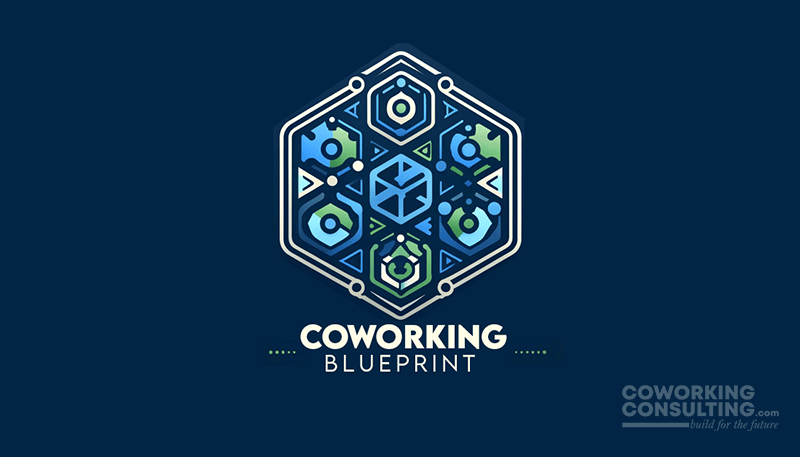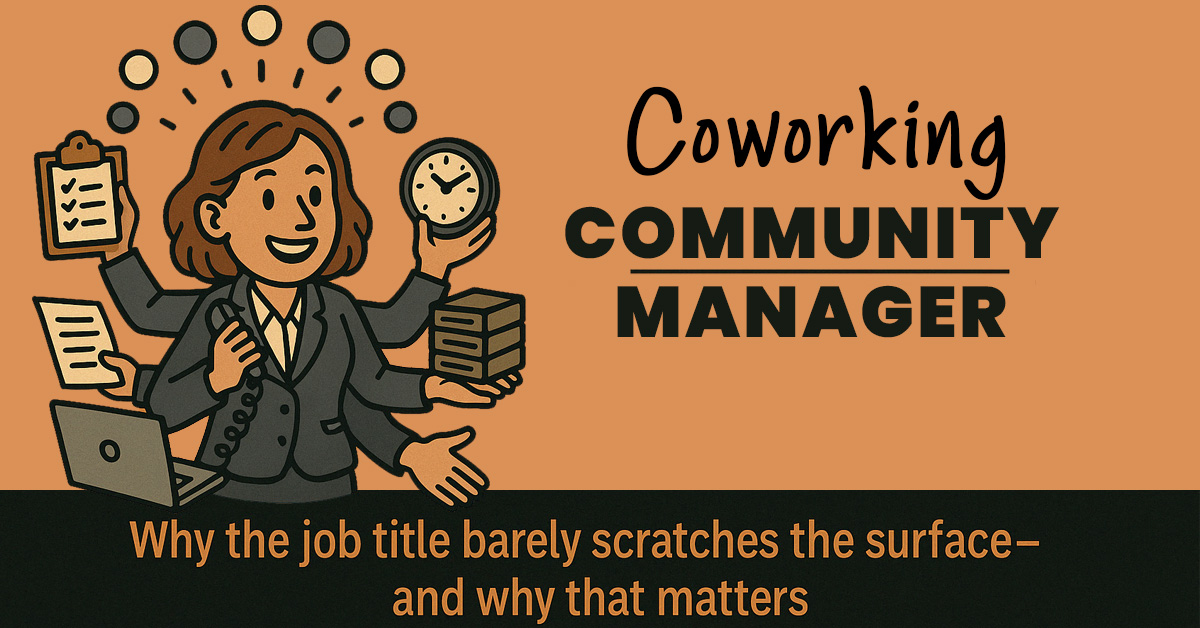The job title may say “community”—but the reality goes far deeper. This post is a nod of recognition, a reality check, and a reframing of what the role truly involves.
If you’ve ever spent even one day managing a coworking space, you know this image above isn’t just funny—it’s the truth. Your actual job title might say “community manager,” but anyone who’s done the work understands: that label hardly captures half of what you do each day.
The Owner’s Lens: Profitability First
Coworking space owners and developers understandably spend most of their days thinking about numbers. Rent checks loom large, investor expectations are relentless, and empty desks can feel like financial quicksand. The questions owners face daily are:
- Occupancy: Every empty desk feels like lost revenue.
- Private-office sales: High-margin contracts can determine if monthly goals are met.
- Revenue per square foot: A critical benchmark for institutional stakeholders.
While “community” frequently finds its way into mission statements and website copy, in real-world conversations around boardroom tables, it can too easily become secondary to these pressing metrics.
But there’s another reality at play—one owners are increasingly beginning to recognize: none of these numbers come to life without you, the coworking manager, tirelessly working behind the scenes.
Beyond “Community”: What the Role Demands
Recently, more coworking owners are beginning to realize something you’ve likely known for a long time: the term “community manager” is incredibly limiting. It paints a rosy picture of facilitating friendships, organizing socials, and occasionally welcoming new members—but that’s just a tiny fraction of your actual day.
Here’s the truth: you’re a master juggler of tasks, a wearer of countless hats, and an unsung hero who somehow makes everything appear seamless—even when it feels anything but.
The role doesn’t live in your title—it lives in the 1,000 invisible actions that make a space feel alive.
Your role likely includes:
- Operations Lead: Troubleshoot tech, reset printers, manage invoices—all with a reassuring smile.
- Event Producer: Coordinate logistics, vendors, room setups, and late-night resets.
- Sales & Marketing: Follow up with leads, write posts, promote events, and keep the brand alive.
- Concierge & Host: Greet members by name. Remember the small stuff. Make them feel known.
The Role is Bigger Than the Title
Coworking managers don’t just manage members—they manage moments, systems, surprises, and everything in between.
You’re coordinating vendors, troubleshooting tech issues, onboarding new members, planning events, handling systems, and keeping daily operations running—all while making it feel seamless.
And finally, more space owners are starting to realize it. To find—and keep—great talent, they’re learning that titles matter. Not just for recruiting, but for honoring the actual scope of the work.
Your role is bigger than “community manager.” Job titles are starting to evolve to better reflect the real complexity, responsibility, and impact of what you do each day. More accurate versions might include:
- Operations & Hospitality Lead
- Coworking Experience Manager
- Member Success & Ops Manager
- Director of Events & Experience
- Coworking Management Executive (for senior-level managers overseeing multiple locations)
But these shifts aren’t just about language. They’re about ensuring your role is respected and understood—because coworking staffing is layered. From part-time associates to regional leaders, every position plays a part in shaping the member experience.
We’ve even seen teams rethink their entire org chart—distinguishing between associate, mid-level, and executive roles to create more scalable, supportive environments.
Whether you’re running a single space or helping lead a growing network, the title should reflect the truth: you’re not just “managing community.” You’re managing everything that makes coworking work.
From Reactive to Proactive: Finding Your Flow
Managing a coworking space can sometimes feel like you’re in constant firefighting mode. But imagine if your days felt less chaotic and more intentional—like you had room to breathe.
Think of a hotel front desk staffed by just two or three people, who somehow smoothly handle hundreds of guests each day. It looks effortless, but behind those calm, welcoming faces are thoughtfully designed routines and lightweight systems quietly humming in the background.
Your coworking space likely already has routines—daily checklists, onboarding scripts, handover notes. But leaning into these intentionally and consistently can transform your day, giving you the mental clarity and bandwidth you need. It’s not about adding more—it’s about creating space to engage authentically, rather than always feeling rushed and reactive.
We see you. And increasingly, coworking owners do, too.
You Are the Member Experience
The truth is, what you do every day is the heartbeat of the coworking industry. Occupancy numbers and sales targets matter—they have to—but it’s your steady presence, your calm in the storm, your unseen but essential efforts that keep members happy, engaged, and coming back day after day.
Coworking spaces aren’t successful simply because they provide desks or fast Wi-Fi. They’re successful because they have someone like you at the center, orchestrating dozens of tasks and interactions with skill and care.
Owners and developers are beginning to appreciate this more fully—realizing the role must be clearly defined, respected, and supported. Your invisible efforts deserve to be recognized not just in conversation but in clarity around job descriptions, roles, and even titles themselves.
So if no one has told you lately: we see you.
The late nights, the last-minute fixes, the small things no one notices—but everyone feels. You’re not just a community manager. You’re what makes coworking work.


